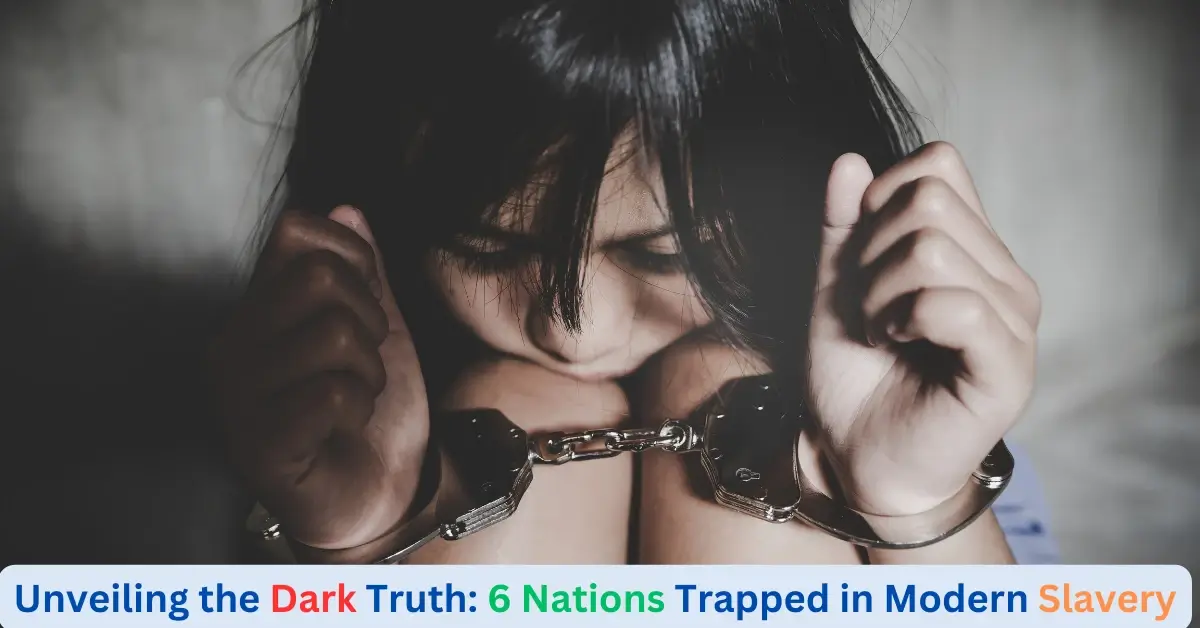
Unmasking the Shackles: 6 Nations Still Ensnared
The year is 2023, and the world finds itself at a precarious juncture, locked in a relentless struggle against an insidious adversary – modern slavery. Despite its universal prohibition, millions remain ensnared in this sinister practice. From the tyranny of forced labor to the horrors of human trafficking, modern slavery manifests in diverse guises, with each nation battling its own distinctive demons.
1. North Korea: A Regime’s Iron Grip
North Korea, a perennial offender in the realm of modern slavery, showcases an authoritarian regime that subjects its populace to relentless forced labor, both on domestic soil and beyond. Within the nation’s borders, hundreds of thousands languish in labor camps, subjected to unforgiving conditions. Internationally, North Korea exports its workforce to countries like Russia and China, pocketing a significant chunk of their wages, effectively reducing them to modern-day indentured servants.
In North Korea, the citizens endure life under a regime that has perfected the art of coercion. Forced labor runs rampant, basic rights and freedoms are stripped away, and hope for a brighter future seems elusive. But can change ever find its way to this desolate land?
2. Eritrea: The Endless Chains of National Service
Eritrea is infamous for its system of indefinite national service, a labyrinth that consigns its people to forced labor for an indeterminate period. Many have likened this ordeal to modern slavery. The youth and adults of Eritrea can be conscripted into various roles, from military service to public works and civil administration. Defiance often invites imprisonment, torture, or even death.
In Eritrea, the citizens dwell in a nightmarish limbo, their destinies hanging in the balance, entirely dictated by the government’s whims. What path can lead them out of this relentless cycle of coerced labor?
3. Mauritania: The Perseverance of Slavery’s Ghost
Mauritania, despite an official ban on slavery, continues to grapple with the enduring legacy of hereditary servitude. The descendants of the Haratine, a historically enslaved group, continue to face severe socio-economic disparities and are often forced to work without compensation as domestic servants or in the fields. For these individuals, escape from the clutches of exploitation remains a distant dream, trapped by the twin specters of poverty and discrimination.
Mauritania’s battle against the chains of hereditary slavery is a testament to the resilience of deeply ingrained practices. How can this nation and the global community join forces to finally eradicate this abhorrent tradition?
4. Saudi Arabia: Migrant Workers in the Abyss
Saudi Arabia heavily relies on a foreign labor force, with a substantial number of these workers being migrants. Many find themselves ensnared in exploitative circumstances, where employers confiscate their passports, withhold wages, and subject them to grueling work hours. Despite some governmental efforts to improve labor conditions, many migrant workers still straddle the precipice of modern slavery.
Migrant workers in Saudi Arabia are trapped in a complex web of exploitation, grappling with myriad challenges. How can we safeguard their rights and improve their living conditions?
5. Turkey: Child Labor’s Silent Scream
Turkey faces scrutiny for its employment of child labor in the textile industry. Children hailing from impoverished regions are often thrust into factories, laboring under perilous conditions. Many toil endlessly for meager compensation, robbed of educational opportunities. While the government has taken some steps to combat this issue, the struggle persists.
In Turkey, the youngest members of society toil away in textile factories, their childhoods sacrificed on the altar of profit. What measures can be taken to eradicate child labor and grant these children a brighter future?
6. Russia: The Shadows of Human Trafficking
Russia grapples with the specters of human trafficking and forced labor, particularly among vulnerable groups like migrants, refugees, and women. Victims are often lured under false pretenses and coerced into exploitative conditions. The Russian government has initiated efforts to combat this menace, but the challenge remains formidable.
In Russia, the shadows of human trafficking and forced labor loom large and ominous. How can the nation confront this issue and establish a safer haven for its most vulnerable citizens?
7. Unraveling the Enigma of Modern Slavery
Modern slavery is not an isolated phenomenon; it’s a pervasive global dilemma that inflicts suffering on millions. To confront it effectively, we must comprehend its vastness and intricacy. Modern slavery takes on various forms, from forced labor to debt bondage and human trafficking, preying on the vulnerable and thriving in the darkest corners of society.
So, what exactly constitutes modern slavery, and how can we identify it when it hides in plain sight? Grasping the complexity is the first step towards its eradication.
8. The Roots of Modern Slavery
The roots of modern slavery run deep, entwined with historical, cultural, and economic factors. In some instances, this malevolent institution has spanned generations, making liberation an arduous endeavor. To effectively combat modern slavery, we must confront these deep-seated issues and strive for social and economic equity.
How have history and culture perpetuated the persistence of modern slavery, and what strategies can uproot these deeply entrenched practices?
9. The Global Ramifications of Modern Slavery
Modern slavery casts a long shadow not only over the individuals ensnared within its grasp but also over the world at large. It erodes human rights, perpetuates poverty, and fuels criminal enterprises. Its consequences transcend borders, necessitating international collaboration and unwavering commitment to its annihilation.
What broader impact does modern slavery have on society and the global community, and how can we effectively address these repercussions?
10. Global Endeavors to Combat Slavery
Numerous international organizations and governments have launched initiatives to combat modern slavery. From the United Nations’ Sustainable Development Goals to the International Labour Organization’s conventions, these endeavors offer a glimmer of hope on the horizon. However, much more remains to be done.
What international initiatives are currently in motion to battle modern slavery, and how effective have they been in making a difference?
11. Breaking the Chains: Tales of Resilience
Amid the darkness of modern slavery, stories of fortitude and tenacity emerge. Individuals who have broken free from their captors and rebuilt their lives serve as beacons of inspiration and hope. These stories illuminate the possibility of freedom with the right support and resources.
Could you share some narratives of individuals who have escaped the clutches of modern slavery and embarked on a journey towards a brighter tomorrow?
12. Your Role in the Fight Against Modern Slavery
The battle against modern slavery is not the sole responsibility of governments and organizations. Everyday individuals, like you, can make a difference. Whether through supporting anti-slavery NGOs, raising awareness, or demanding ethical supply chains, there are steps you can take to contribute to the crusade against modern slavery.
What actions can ordinary people undertake to play a part in ending modern slavery and advocating for transformation?
13. The Force of Awareness and Education
Increasing awareness and educating others about modern slavery wield immense power in the fight against this grievous injustice. As more people comprehend the issue and its far-reaching implications, they become champions of change. Awareness and education serve as the keys to a future liberated from modern slavery.
How can we spread awareness and educate our communities about the realities of modern slavery?
14. In Closing: The Call to End Modern Slavery
In 2023, modern slavery continues to afflict far too many lives worldwide. It is our moral obligation to unite in a collective effort to vanquish this abominable practice. By comprehending its multifaceted nature, addressing its underlying causes, and lending support to international initiatives, we can forge a world where no soul remains enslaved.
The time has come to rally our resolve and take decisive action to terminate modern slavery. Will you heed the call to effect change?
15. Frequently Asked Questions About Modern Slavery
- What constitutes modern slavery? Modern slavery encompasses various forms of exploitation, including forced labor, human trafficking, and debt bondage, wherein individuals are coerced or deceived into toiling under oppressive conditions.
- How does modern slavery impact the global economy? Modern slavery perpetuates poverty and nurtures criminal enterprises, eroding economic development and human rights on a global scale.
- What global initiatives are in place to combat modern slavery? International entities like the United Nations and the International Labor Organization have instituted programs and conventions aimed at eradicating modern slavery and human trafficking.
- Are there tales of individuals breaking free from modern slavery? Indeed, there exist uplifting stories of individuals who have liberated themselves from the clutches of modern slavery and charted a course toward a brighter future with the aid of support and resources.
- How can I contribute to the fight against modern slavery? You can play a vital role in the battle against modern slavery by supporting anti-slavery organizations, raising awareness, advocating for ethical supply chains, and educating others about this grave issue. In conclusion, modern slavery is a global challenge that demands our attention and action. Together, we can work towards a world where freedom is a reality for all, and the chains of modern slavery are forever broken.





